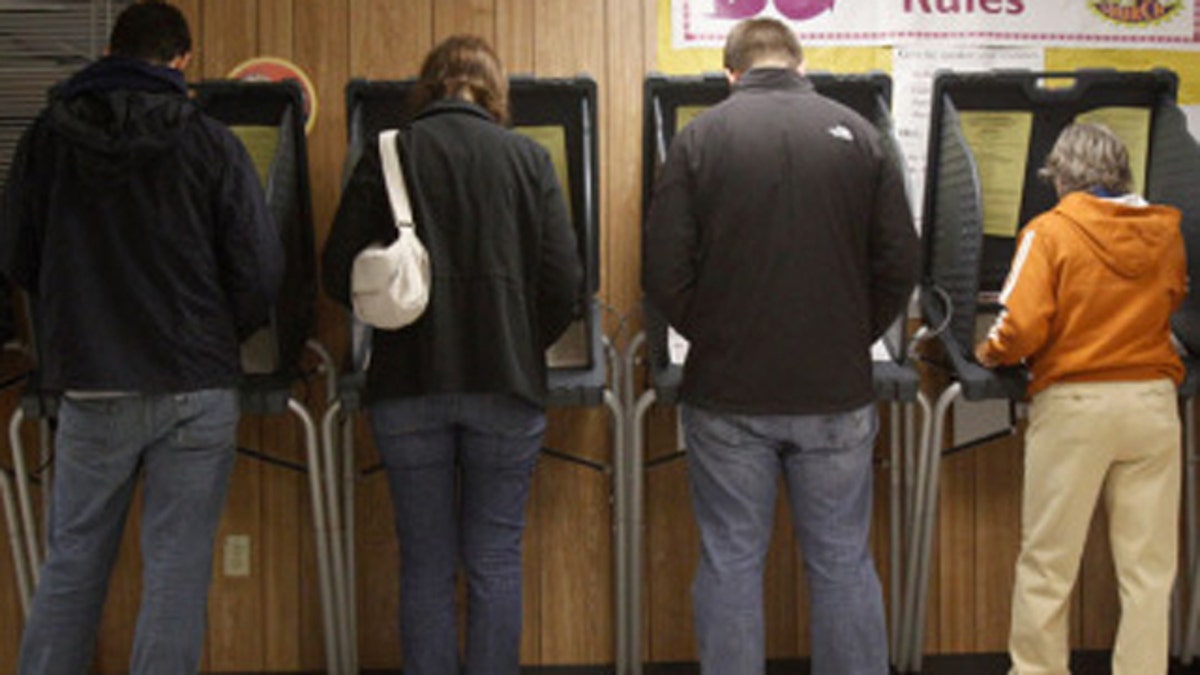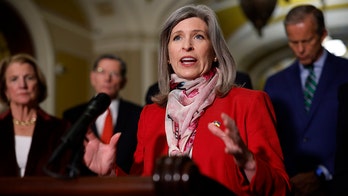
Voters are shown in this Nov. 2, 2010, photo casting ballots in Texas. (AP)
Election officers in states with newly approved voter ID laws are trying to make sure voters can meet the new requirements without much hassle, pushing back on complaints that the laws are tantamount to a "poll tax."
Seven states this year have approved new laws requiring or urging voters to show photo ID before casting their ballots. Critics have assailed these measures as a partisan Republican scheme to skew elections by disenfranchising voters who might be inclined to vote for Democrats but lack the proper identification.
But officials in those states say the criticism is unfair. All seven states are moving to offer residents at least one version of a photo ID card free of charge. Local agencies are planning various outreach efforts to get the word out about the new requirements, and the new laws generally allow voters without photo ID to fill out a provisional ballot under certain circumstances.
In Tennessee, one of the seven states, officials are going to be offering free photo IDs at local DMV offices -- for voting purposes, not driving.
"We're going to be doing a lot of outreach ... to educate people about the law," said Blake Fontenay, spokesman with the Tennessee Department of State. "We don't feel that it's fair to call this a poll tax when a person can get an ID free of charge."
Among those comparing the provision to a poll tax are the Rev. Jesse Jackson, who used the term last week in discussing the South Carolina law. Former President Bill Clinton also said recently that Republican voting proposals across the country are some of the most restrictive in history since the poll tax and "all the other Jim Crow burdens."
In addition, a local South Carolina activist reportedly described the law as an alternative to "hoods and Klan meetings" at a forum Monday sponsored by the NAACP. The Democratic Governors Association has described voter ID and other GOP-backed proposals as "voter suppression bills."
But the states involved dispute those characterizations.
South Carolina is preparing a two-pronged approach. To start, the state has waived the $5 fee on its DMV-issued photo ID card and is working on creating a separate voter registration card with a photo which, once available, will also be free.
South Carolina, though, has become a battleground for the new voter ID laws. Groups are pushing back on the new requirement and pressuring the Justice Department -- which must approve the state's voter law because of its history of discrimination -- to challenge it.
A group called The Progressive Network claims the law will prevent thousands of state residents from voting. It cited state statistics showing nearly 180,000 citizens have registration cards without state-issued photo ID. The group is gathering affidavits from residents to document the "difficulties and expenses" associated with obtaining that kind of identification. Among the claims is that the new law would make it more difficult for someone without a proper birth certificate to vote.
But Chris Whitmire, assistant to the director of the State Election Commission, said that would "not be an issue" once the new photo voter registration cards are ready. He said that while the DMV requires a birth certificate for its ID, voters would need only provide a bank statement or utility bill or other proof of residence to obtain the new voter registration cards.
Other states with new voter ID laws include Kansas, Rhode Island, Wisconsin, Alabama and Texas.
In Wisconsin, Milwaukee Election Commission Director Sue Edman told FoxNews.com that a free DMV-issued photo ID is already available.
"They're ready to go with it," she said. "They're simply waiving the fees."
Critics of the new laws suggest they are a solution in search of a problem -- that voter fraud is nowhere near as big of an issue as sponsors of this legislation make it out to be.
But supporters say it shouldn't be too much to ask to require photo ID at the voting booth, considering such identification is required for everything from buying alcohol to purchasing certain medicines.
"You can't cash a check, board a plane or drive without one. That is why it's not unreasonable to require picture identification to protect our most important privilege of citizenship," Kansas Secretary of State Kris Kobach wrote in an op-ed Sunday in The Washington Post.




